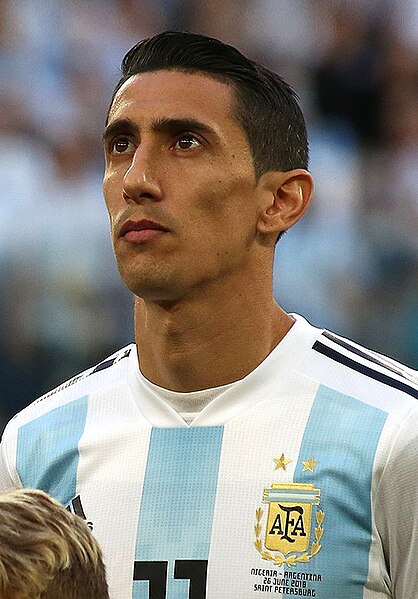Contents
- 1 Introduction
- 2 Early Life and Beginnings
- 3 Breaking into Professional Football
- 4 Move to Europe: The Benfica Era
- 5 The Real Madrid Years: Becoming a Star
- 6 Transfer to Manchester United
- 7 Paris Saint-Germain (PSG): A New Chapter
- 8 International Career with Argentina
- 9 Playing Style and Strengths
- 10 Challenges and Injuries
- 11 Off the Field: Personal Life
- 12 Legacy and Influence
- 13 Criticism and Controversies
- 14 Current Status and Future Prospects
- 15 Conclusion
- 16 FAQs
Introduction
Football is a sport that has produced numerous legends, but few can match the flair and versatility of Angel Di María. Known for his agility, vision, and dribbling prowess, Di María has left an indelible mark on the game. His journey from a young boy in Argentina to becoming one of the most respected footballers worldwide is a story of talent, determination, and resilience. Angel Di María Biography

Early Life and Beginnings
Born on February 14, 1988, in Rosario, Argentina, Angel Fabián Di María Hernández was destined to make his name in football. Growing up in a working-class family, football was more than just a game—it was a way out of poverty. Di María showed an early affinity for the sport, often kicking around makeshift balls in the dusty streets of his neighborhood.
His potential was evident from a young age, leading to his enrollment in local youth academies. It wasn’t long before his exceptional skills caught the attention of scouts, and he was quickly on the path to professional football .Angel Di María Biography
Breaking into Professional Football
Di María’s professional career began with Rosario Central, a club in his hometown. At just 17, he made his debut for the first team in 2005, displaying the kind of flair that would become his trademark. His performances in the Argentine league were nothing short of impressive, with his pace and ability to take on defenders setting him apart.
The young winger’s talent soon attracted international attention, leading to his first major move abroad.Angel Di María Biography
Move to Europe: The Benfica Era
In 2007, Di María made the significant move to Europe, signing with Portuguese giants Benfica. This transition marked a crucial stage in his development. The Portuguese league provided him with the perfect platform to hone his skills against tougher competition.
At Benfica, Di María quickly established himself as a key player, contributing to the team’s domestic success and making waves in European competitions. His three seasons with the club were marked by numerous accolades, including a Portuguese League title in 2009-2010. This period was pivotal in shaping him into the player who would soon take on even bigger challenges.
The Real Madrid Years: Becoming a Star
In 2010, Di María’s career took a monumental leap forward when he signed with Spanish giants Real Madrid. Joining a club of this stature was a dream come true, and Di María didn’t disappoint. He quickly became an integral part of the team, known for his ability to provide assists and score crucial goals.Angel Di María Biography
At Real Madrid, Di María’s versatility shone brightly. Whether deployed as a winger, attacking midfielder, or even a central midfielder, he excelled. His partnership with Cristiano Ronaldo was particularly fruitful, with Di María often setting up the Portuguese superstar for goals.
One of the highlights of his career came in the 2013-2014 season when Di María played a crucial role in Real Madrid’s run to the UEFA Champions League final. His man-of-the-match performance in the final against Atlético Madrid was a testament to his quality, as he assisted the equalizer that led to Real Madrid securing their historic 10th European Cup, La Decima.
Transfer to Manchester United
In 2014, after a stellar World Cup with Argentina, Di María made a high-profile move to Manchester United. The transfer was met with great excitement, as fans hoped his arrival would mark a new era of success at Old Trafford. However, things didn’t go as planned.
Despite a bright start, including a memorable goal against Leicester City, Di María struggled to adapt to the physicality and pace of the Premier League. Injuries and tactical disagreements with then-manager Louis van Gaal further hampered his progress. After just one season, he departed for Paris Saint-Germain, leaving behind a mixed legacy in England.
Paris Saint-Germain (PSG): A New Chapter
Di María’s move to Paris Saint-Germain in 2015 marked the beginning of a new chapter in his career. At PSG, he found the perfect environment to thrive, surrounded by a team full of talent. His arrival brought an added layer of creativity and experience to the squad, contributing to their dominance in French football. Angel Di María Biography
During his time at PSG, Di María has been instrumental in the club’s success, helping them secure multiple Ligue 1 titles, domestic cups, and making significant strides in the UEFA Champions League. His performances in key matches, including the 2020 Champions League final, solidified his reputation as a big-game player.
International Career with Argentina
While Di María’s club career has been glittering, his journey with the Argentina national team has been equally eventful. He has represented his country in multiple World Cups, Copa América tournaments, and even the Olympics, where he scored the winning goal in the 2008 final against Nigeria, securing the gold medal for Argentina.
One of his most iconic moments came in the 2021 Copa América final against Brazil, where Di María scored the only goal of the match, leading Argentina to their first major international trophy in 28 years. This victory was particularly sweet, as it helped cement his legacy in Argentine football.
Playing Style and Strengths
Di María is often described as a magician on the pitch. His ability to glide past defenders, deliver inch-perfect crosses, and score from distance makes him a nightmare for opponents. A versatile player, he has excelled in various roles, whether as a winger, attacking midfielder, or even in a deeper role.
His left foot is particularly renowned, capable of delivering exquisite passes or curling shots into the top corner. Di María’s vision and creativity are second to none, often seeing opportunities that others might miss. Comparisons with legends like Luis Figo and Ryan Giggs are common, highlighting his status as one of the best of his generation.
Challenges and Injuries
Despite his many successes, Di María’s career has not been without challenges. Injuries have been a recurring issue, often sidelining him at crucial moments. His determination to bounce back from these setbacks is a testament to his resilience.
One of the most notable instances was during the 2014 World Cup, where an injury in the quarter-final against Belgium ruled him out of the rest of the tournament, including the final. Despite this, his contributions in getting Argentina to the final were widely recognized.
Off the Field: Personal Life
Off the pitch, Di María is known for being a family man. He is married to Jorge Lina Cardoso, and the couple has two daughters. His humility and grounded nature have endeared him to fans and teammates alike.
Di María is also involved in various charitable activities, often giving back to his community in Argentina. His dedication to helping others reflects his strong values and commitment to making a positive impact off the field.
Legacy and Influence
Di María’s influence extends beyond the clubs he has played for. His journey from the streets of Rosario to the biggest stages in world football is an inspiration to young players worldwide. His ability to overcome obstacles and perform at the highest level for over a decade is a testament to his talent and work ethic.
For Argentina, Di María’s name will forever be associated with that historic night at the Maracanã in 2021, where he helped end the nation’s long wait for a major trophy. His contributions to Real Madrid’s La Decima and PSG’s rise in European football further cement his legacy.
Criticism and Controversies
Like any top player, Di María has faced his share of criticism. His time at Manchester United is often cited as a low point, with many questioning his commitment and adaptability. There were also controversies surrounding his departure from Real Madrid, where some fans felt he was undervalued by the club’s management.
However, Di María has always let his performances on the pitch do the talking. His ability to rise above criticism and continue to perform at the highest level speaks volumes about his character.
Current Status and Future Prospects
As of now, Di María continues to play at a high level, contributing to PSG’s success both domestically and in Europe. Speculation about his future post-retirement often includes potential coaching roles or a return to Argentina to finish his playing career.
Whatever path he chooses, there is no doubt that Di María will remain a significant figure in football, whether on the pitch or in a different capacity.
Conclusion
Angel Di María’s career is a story of passion, perseverance, and pure footballing genius. From his early days in Rosario to becoming a key player for some of the biggest clubs in the world, Di María has consistently proven his worth. His legacy as one of the greats is secure, with fans and pundits alike recognizing his contributions to the beautiful game.
FAQs
Q1: What is Di María’s most memorable goal?
Ans: Di María’s most memorable goal is arguably the one he scored in the 2021 Copa América final against Brazil, securing Argentina’s first major international trophy in 28 years.
Q2: How many clubs has Di María played for?
Ans: Di María has played for several clubs, including Rosario Central, Benfica, Real Madrid, Manchester United, and Paris Saint-Germain.
Q3: Has Di María won a World Cup?
Ans: No, Di María has not won a World Cup, but he was a key player in the Argentina squad that reached the final in 2014.
Q4: What is Di María’s preferred position on the field?
Ans: Di María is versatile and has played in various positions, but he is most often deployed as a winger or attacking midfielder.
Q5: How does Di María contribute off the pitch?
Ans: Di María is known for his charitable work, particularly in his hometown of Rosario, where he supports various community initiatives.

